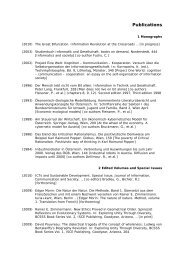CHRISTIAN FUCHS - ICT&S - Universität Salzburg
CHRISTIAN FUCHS - ICT&S - Universität Salzburg
CHRISTIAN FUCHS - ICT&S - Universität Salzburg
Create successful ePaper yourself
Turn your PDF publications into a flip-book with our unique Google optimized e-Paper software.
Christian Fuchs: Social Networking Sites and the Surveillance Society1. Introduction”Facebook’s Roar Becomes a Meow: Putting ads in front of Facebook users is like hanging out at a party andinterrupting conversations to hawk merchandise” (Newsweek, October 10, 2008).“Who Will Rule the New Internet? (…) Still, for wonks like me, it's been riveting to watch three of the most innovativecompanies in Silicon Valley – each representing a fundamental phase of the information era – battle it out. Apple,Google and Facebook are, respectively, an icon from the pioneering days of personal computers; the biggest, mostprofitable company yet born on the Web; and a feisty upstart whose name is synonymous with the current migrationto social networks. (...) In many ways, these companies are technology's standard-bearers, though their guidingphilosophies differ. Google, for instance, advocates an "open" Web and tends to push for open standards and alliancesamong developers. Facebook, with its gated community of 70 million active users, offers a more controlled experienceand, so far at least, wants to keep its users safely within its walls” (Time Magazine, June 4, 2008).“Facebook: Movement or Business? (…) Yesterday, while he [Facebook’s CEO Mark Zuckerberg] talked about themovement and how Facebook's goal was to be a place that promotes sharing and connecting, I couldn't help thinkingabout Beacon. You might recall that Beacon, an advertising play, was intended to broadcast Facebook users' purchasesfrom external websites. Initially, it was forced on users; there was no opting out. But that turned out to be anightmare for the young company. Zuckerberg had to apologize and retreat. ‘We made a lot of mistakes during the pastyear,’ he admitted yesterday. Clearly, explaining to your users how advertising works on a social network was one ofthem. (…) Advertising is the essence of Facebook's business; it's the great and shining hope of that company andsocial media in general. (…) And the only kind of movement that is, is the movement of money” (Time Magazine, July24, 2008).“Time’s Person of the Year 2006: You. (…) But look at 2006 through a different lens and you'll see another story, onethat isn't about conflict or great men. It's a story about community and collaboration on a scale never seen before.It's about the cosmic compendium of knowledge Wikipedia and the million-channel people's network YouTube and theonline metropolis MySpace” (Time Magazine, December 13, 2006).“Facebook, studiVZ, Xing, etc: Study warns: Data are not save enough. Social networks like Xing, studiVZ or Facebookbecome ever more popular. For maintaining contacts, users reveal private data online – very consciously. Nonethelessmore possibilities should be offered for securing and encrypting private details, criticizes the Fraunhofer Institute forSecure Information Technology in a new study” (Bild, September 26, 2009).“Prostitution on studiVZ? Ever more female students are looking for punters in the community studiVZ in order tofinance their studies” (Bild, September 16, 2008).“The Future President, on Your Friends List. (…) HAVING already launched a generation of Gwen Stefani clones anddeath-metal bands into fleeting Internet fame, MySpace – the largest social-networking site – is now setting its sightshigher: to help elect the next president of the United States. This week, the site will introduce a section dedicated topolitics, with an emphasis on the 2008 presidential election. Called the Impact channel, it will be an online version ofa town square, a collection of links to political MySpace pages that will make it easier for the site’s 60 millionAmerican users per month – many of them from the traditionally elusive and apathetic youth demographic – toperuse the personal MySpace pages of, so far, 10 presidential candidates“ (New York Times, March 18, 2007).“Online profile gives China's Premier Wen ‘face’ with world public. Premier Wen Jiabao has become the sixth mostpopular politician on the U.S.-based Facebook, a popular social networking site, with more than 44,000 ‘supporters’”(People’s Daily, China, June 3, 2008).“Love online. (…) My school friend Mayank once swore that he would never date a girl he didn’t know well. Imaginemy shock when I heard one day, that he is head over heels in love with a girl, whom he met on a social networkingsite. It all started when he left her a message that praised her profile picture. A few days later, she reverted with asmart answer. Soon they chatted on yahoo, then exchanged cell phone numbers. They chatted into the night andrealised that they were in love“ (Hindustan Times, India, October 8, 2008).“Mum no longer knows best as teenage girls turn to online social networking sites for advice. (…) Teenage girls areincreasingly turning to social networking websites for guidance on personal matters, rather than seeking advice fromtheir mothers” (Daily Mail, July 22, 2008).“Nursery nurse has boob job paid by 100 men she doesn't know - thanks to social networking site (…) A mum who hada breast enlargement has 100 men and a social networking site to thank for her new assets” (Daily Mail, July 14,2008).1









